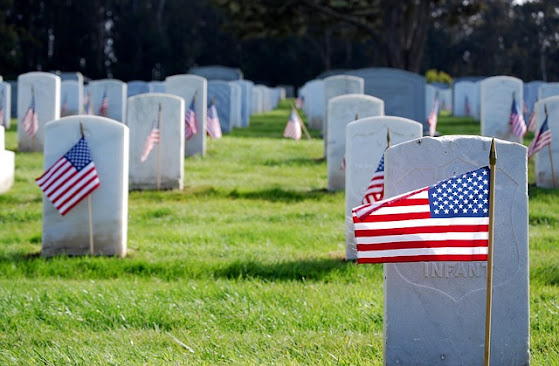It was Memorial Day! Men stood stiffly at attention, rifle salutes were fired, and the bugle-blown "taps" tingled every spine. No one seemed to notice the small boy, a blood-red geranium in hand, who knelt before a craggy boulder in a New York park.
"I'm giving this to you," he whispered, placing the flower at the unmarked grave, "because nobody knows who you are."
Almost forgotten in the passing of more than 150 years was the mass grave of some 300 "unknown" soldiers of the War of 1812. Just as obscure, the passing of time dimming memories of him, is General John Alexander (Black Jack) Logan, who gave us our first Memorial Day just a century ago.
Logan was a carefree youth of 20 when he left his home in southern Illinois and galloped the nearly 30 miles to the town of Marion. "I'm going to join up!" he told his father. The Mexican War was just beginning.
"Black Jack" was doomed to disappointment. The captain in charge stated matter-of-factly, "We're all filled up!" That didn't stop Logan. He was an adventurer. He had fought river pirates on the Ohio and the Mississippi Rivers. He had tangled at knife range with grizzlies. He went to another Illinois town and joined a band of volunteers.
John Logan fought in the Mexican War. He was well-liked, tall, black-haired, a born leader. After the war he turned to politics and was elected a state prosecuting attorney. A tall, gangling Abe Lincoln often crossed his path.
By horseback and buggy, Logan covered the Third Judicial District of Illinois. One day, stopping in the old river port of Shawneetown, he was amazed to find, when he visited a family he had known since the Mexican War, that their little daughter had grown into a ravishing beauty.
Logan wasted no time, popped the question, and was married in 1855. The Logans set up housekeeping in Benton. His wife Mary urged him to try for Congress. He was eventually elected to both the House and Senate.
But war clouds were gathering. Mary was apprehensive. Her brothers would fight on the Confederate side; her husband for the North. Where would her loyalties lie?
John Logan recruited the first companies of the 31st Illinois Regiment.
Later, as a colonel, he led them into battle. On one occasion, Confederate shells tore huge gaps in the Union lines and Logan's horse died beneath him.
Back home, his wife stood by him. She nursed the wounded and went on personal crusades to beg bedding and food for her patients. She encouraged her husband during the darkest hours of the bitter strife. Logan was Commander of the Army of the Tennessee at the Battle of Atlanta when the Civil War ended.
It was about a year later, in April 1866, that hundreds of people gathered at a small cemetery in Carbondale, in southern Illinois, to decorate graves of soldiers buried there and to honor their memory. The speaker for the occasion was their most illustrious native son, the man General Grant called "the best soldier and officer of all the Union volunteers," Major General John A. Logan.
The simple observance made such a profound impression on the indomitable Logan that two years later, urged on by his wife Mary to "do something to remember those courageous men," he took steps to perpetuate their memory. As Commander-in-Chief of the Grand Army of the Republic, Logan issued his now-famous General Order No. 11, which set aside May 30 "for the purpose of strewing flowers and otherwise decorating the graves of comrades who died in defense of their country..."
Even before May 30 had been observed nationally, several southern states had decorated the graves of their fallen on this date. Memorial Day is now dedicated to the fallen of all wars.
Logan's fame increased and reached its crest when he ran unsuccessfully for Vice President in 1884 on the ticket with James G. Blaine. Logan was forgotten for years until a giant equestrian statue was erected in his honor in our nation's capital.
This year, as in the past, May 30 will be a day for us to reaffirm our obligation to those who have marched courageously into the Valley of the Shadow of Death. With tear-dimmed eyes we can dedicate ourselves again to maintain that pride in our nation which surges from sacrifice in a thousand out-of-the-way places. Brave fighters for freedom have died with our flag before their eyes and our national anthem on their lips.
At Arlington and Pearl Harbor, on the once-bloody beaches of Normandy, on the battle-scarred hills of Korea, in the rice paddies of Vietnam, lie the bones of men who said "No!" to aggression. We know they loved our country and feared no man.
As John Logan once said: "What better can we say of any man than that he laid down his life for his friends?"
That's why we have a day for remembering. We can say it loud and clear for the world to marvel at: "We salute your memory, Mr. America. May we always uphold this land and the ideals for which you gave your life!"
To the Reader: The passing of time has dimmed the authenticity of many tales of origin of customs in our nation. And so it is with Memorial Day. Although there is no doubt that, the custom of honoring the fallen heroes of our country was observed in a number of different places previous to 1868, it is generally accepted that the General Order No. 11, issued by "'Black Jack" Logan just over 120 years ago, was the official establishment of this "Day of Remembrance."
{Originally printed MAY 1998; author: Kevin Wallace Coventry}


Comments